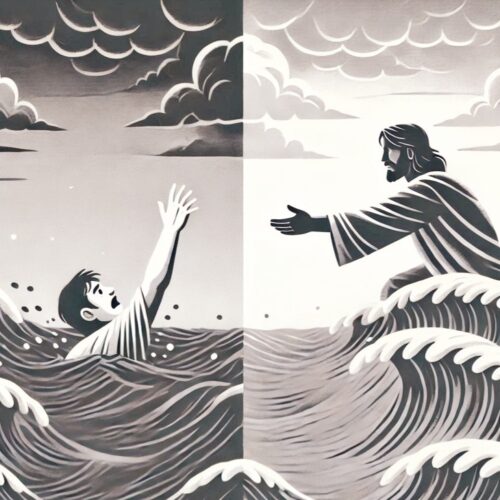The Mystery of Christmas: Why God HAD to Become Man
Picture a drowning man in treacherous waters. Another man on the shore, no matter how willing, cannot save him without entering the water himself. What’s more, a mere human rescuer might drown too. The situation demands someone with both the ability to survive the deadly waters and the capacity to truly reach and grasp the drowning person. This simple picture captures something profound about our salvation: why God had to become man to save us.
The Problem: Our Deep Human Predicament
When sin entered the world through Adam’s fall, it created a catastrophe far graver than most realise. We didn’t just make poor choices or wander off course—we plunged into complete spiritual death. Sin corrupted every aspect of our being: our minds, wills, and emotions. Like a computer with corrupted source code, we cannot simply reboot ourselves into righteousness.
But our situation’s even worse. We don’t just need healing; we need perfect righteousness. God’s holy nature demands nothing less than complete perfection. Yet we’re utterly unable to provide it. Every attempt at self-reformation is like trying to clean a dirty window with a mud-soaked cloth—we only make things worse.
Moreover, we’ve incurred a debt we cannot pay. Our sin against an infinite God demands an infinite payment. We stand guilty before divine justice, unable to satisfy its demands. We need both perfect righteousness and complete payment for sin—requirements far beyond human capacity.
Why Our Mediator Must Be Fully God
This is where the genius of divine wisdom shines. Our Saviour must be fully God because only God can bear infinite wrath. No mere creature, no matter how exalted, could endure the full force of divine judgement against sin. Only an infinite being can pay an infinite debt.
Furthermore, only God possesses the power to defeat death and Satan. Our enemy held the power of death, and only divine power could break that grip. As Scripture declares, it took nothing less than the mighty power of God to raise Christ from the dead—the same power now at work in believers.
Most crucially, only God can provide perfect righteousness. We needed someone who could not just approximate God’s standards but embody them completely. God’s perfection alone could meet God’s requirements.
Why Our Mediator Must Be Fully Human
Yet being fully God wasn’t enough—our Saviour had to be fully human too. The ancient church fathers captured this beautifully: “What is not assumed is not healed.” To save humanity, Christ had to assume—take on—true humanity.
This necessity flows from the principle of representation. Just as humanity fell through one man’s disobedience, salvation must come through one man’s obedience. Only one who is genuinely human can serve as our representative head, standing in our place legally and morally before God.
Moreover, it takes a human to render the perfect human obedience God required. We didn’t just need our sins paid for—we needed positive righteousness, the kind that could only come from a life of perfect human obedience to God’s law. Christ lived that life as a true human, facing real temptations yet remaining perfectly faithful.
Most solemnly, only a human could truly die in our place. Divine justice demanded human blood for human sin. A true human death was required to satisfy divine justice on behalf of humanity.
The Beautiful Logic of the Incarnation
In the incarnation, we see divine wisdom perfectly solving our impossible dilemma. In one person, Jesus Christ, we have both infinite divine resources and genuine human nature. His divinity gives infinite worth to his human obedience and suffering. His human nature makes that obedience and suffering truly representative of us.
This union of divine and human natures in Christ brilliantly displays how God’s justice and mercy meet. Justice is fully satisfied by Christ’s perfect life and sacrificial death. Mercy flows freely to us through His representative work. Nothing is compromised; everything is fulfilled.
The Incarnation’s Ongoing Significance
The incarnation isn’t just past history—it shapes our present and future. Right now, a human being sits at God’s right hand. Christ continues as our mediator and advocate, understanding our weaknesses because He shared our nature. When we pray, we approach God through one who is still fully God and fully man.
This reality gives remarkable dignity to human nature. God didn’t just create humanity—he took humanity into permanent union with himself. Our bodies and souls matter eternally because Christ assumed both in the incarnation.
This truth provides powerful comfort in our trials. Our High Priest isn’t distant from our struggles. He experienced human weakness, temptation, and suffering. He knows what it means to be human—not theoretically, but experientially.
Conclusion
The Incarnation is the supreme display of God’s wisdom in salvation. No other solution could have met all the requirements of divine justice while opening the floodgates of divine mercy. In Christ’s becoming human, we see both the seriousness of our predicament and the magnificence of God’s solution.
This truth should move us to profound worship. The One who spoke galaxies into existence confined himself to a human womb. The One who sustains all things became dependent on a mother’s milk. The One who owns everything became poor that we might become rich.
As we contemplate this mystery, may it deepen our trust in God’s wisdom and love. The lengths to which God went to secure our salvation show both its necessity and its completeness. In the incarnation, we see that God didn’t take half measures in saving us—he gave himself fully for our full redemption.
Why God HAD to Become Man—Related FAQs
Could God have saved us without becoming human? While God is all-powerful and could have chosen any means consistent with His nature, the incarnation was necessary given His purpose to save us in a way that perfectly satisfied both His justice and mercy. The incarnation wasn’t just one option among many—it was the perfect expression of God’s wisdom, demonstrating both the seriousness of sin and the depths of divine love. Through this means, God ensured our salvation was accomplished through genuine human obedience and substitution, not merely by divine decree.
What does the incarnation mean for Christians today? The incarnation means we have a High Priest who truly understands our human experience and can sympathize with our weaknesses. It assures us that our human nature, including our bodies, matters to God and has been dignified by Christ’s assumption of it. Furthermore, it guarantees that we have a perfect mediator who continues to represent us before the Father.
How does the incarnation prove God’s love? The incarnation demonstrates divine love by showing God’s willingness to enter fully into the human condition, taking on all its limitations and sufferings except sin. Rather than saving us from a distance, God chose to come near, experiencing human life from birth to death. This personal involvement shows that God’s love is not abstract but deeply personal and sacrificial.
Why did God wait so long before sending Christ? The timing of the incarnation demonstrated God’s wisdom in preparing humanity to understand and receive Christ. The long wait established through history and prophecy humanity’s inability to save itself, while developing the cultural and historical context that would best serve to spread the gospel. Scripture says Christ came “in the fullness of time,” when all necessary preparations were complete.
What about those who deny the incarnation? Denying the incarnation undermines the very heart of Christian salvation, as it removes the basis for Christ’s representative work on our behalf. Various groups throughout history have tried to maintain either Christ’s divinity or humanity while denying the other, but this always results in an insufficient salvation. The incarnation is not optional but essential to Christian faith.
How does the incarnation relate to the doctrine of election? The incarnation is the supreme demonstration of God’s sovereign commitment to save His chosen people. Christ took on human nature to effectively secure the salvation of those given to Him by the Father. This shows that God’s electing love includes not just the decree to save but also the provision of all means necessary for that salvation.
What’s the difference between the incarnation and other divine appearances in Scripture? The incarnation was unique because it involved God permanently taking on human nature, not just temporarily appearing in human form. Unlike Old Testament theophanies (divine appearances), the incarnation meant God became truly human while remaining truly God. This union continues eternally, as Christ remains the God-man forever.
Why God HAD to Become Man—Our Related Posts
Editor's Pick

Paul’s Mandate for Men: Headship Or Servant Leadership? Or Both?
Modern Christianity has fallen into a trap. We've created an either/or battle between "headship" and "servant leadership," as if these [...]

Should We Stop Using Male Pronouns for God? Why Do We Say No?
A friend of ours arrived eagerly at his first theology class in seminary. But he quickly discovered something troubling: the [...]

Did Old Testament Law Force Women to Marry their Rapists?
**Editor’s Note: This post is part of our series, ‘Satan’s Lies: Common Deceptions in the Church Today’… Viral misinformation abounds [...]

From Danvers To Nashville: Two Statements, One Biblical Vision
30 years separate the Danvers Statement on Biblical Manhood and Womanhood (1987) and the Nashville Statement on Human Sexuality (2017). [...]

The Nashville Statement: Why Affirm It Despite Media Backlash?
WHY DO REFORMED CHRISTIANS STAND BY THIS STATEMENT ON MARRIAGE AND GENDER? When the Nashville Statement was released in 2017, [...]

Who Is Belial? Solving The 2 Corinthians 6:15 Mystery
Belial: This name from the pages of Scripture chills the soul. Who is this mysterious figure Paul invokes in 2 [...]

Celibacy Or Castration: What Jesus Really Means in Matthew 19:12
One of Scripture's most shocking misinterpretations led theologian Origen to castrate himself in the third century. His tragic mistake? Taking [...]

Philippians 4:13: Did Paul Really Mean We Can Do ALL Things?
"I can do all things through Christ who strengthens me." It's on gym walls, graduation cards, and motivational posters everywhere. [...]

The Ordinary Means of Grace: Why Are They Indispensable?
ORDINARY MEANS FOR EXTRAORDINARY TRANSFORMATION What if God's most powerful work in believers' lives happens through the most ordinary activities? [...]

Is the Bible God’s Word? Or Does It Only Contain God’s Word?
The authority of Scripture stands at the crossroads of modern Christianity. While some argue the Bible merely contains God’s Word [...]
SUPPORT US:
Feel the Holy Spirit's gentle nudge to partner with us?
Donate Online:
Account Name: TRUTHS TO DIE FOR FOUNDATION
Account Number: 10243565459
Bank IFSC: IDFB0043391
Bank Name: IDFC FIRST BANK






